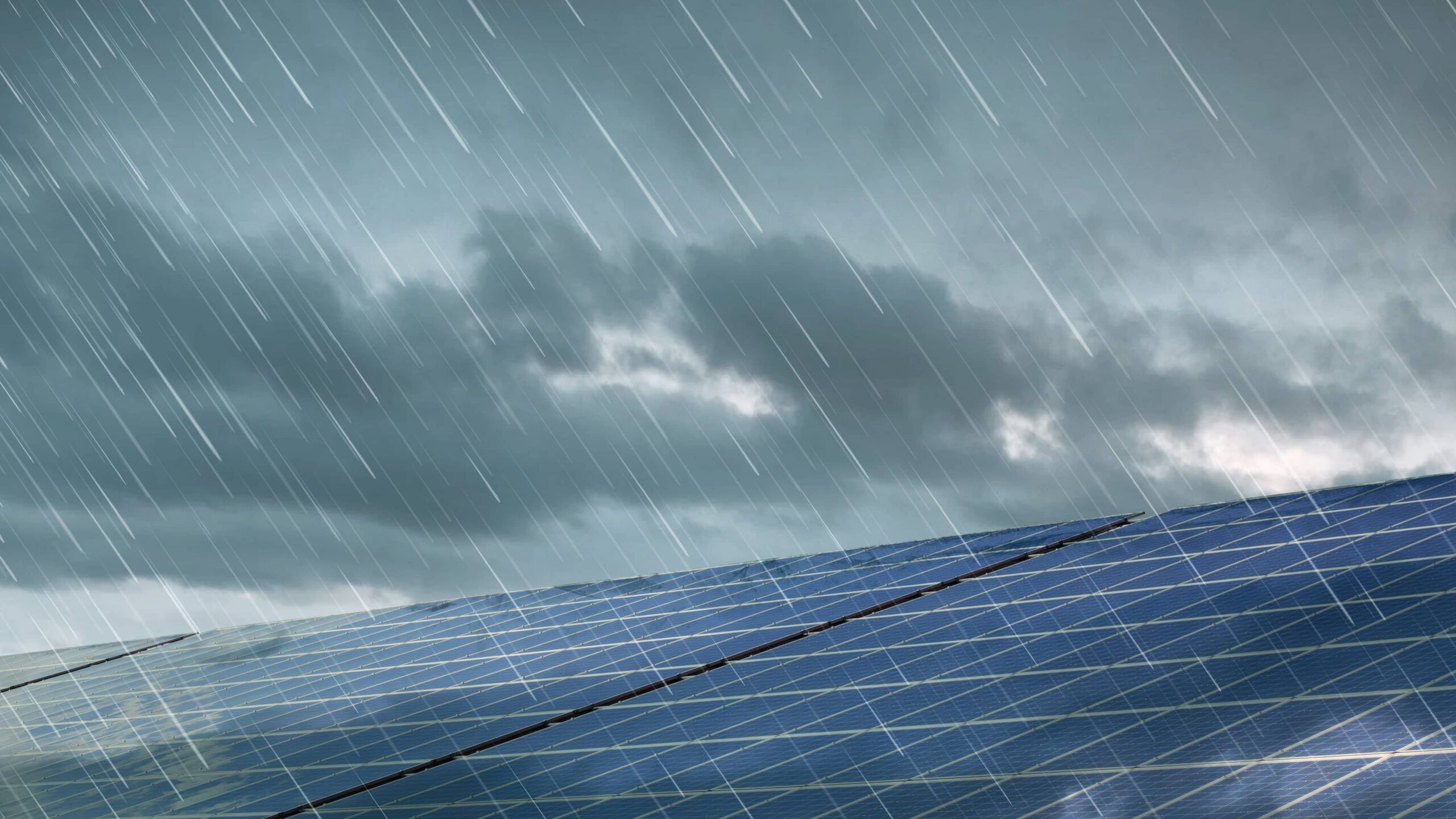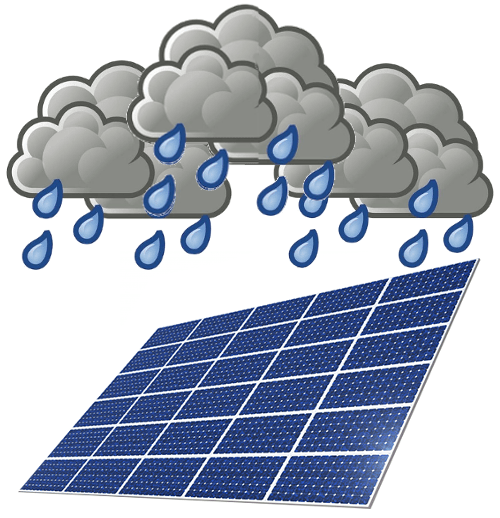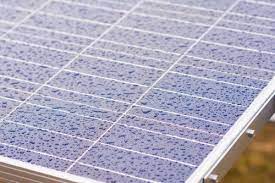Is it Possible to Use Solar in the Rain?

If you're thinking about getting solar panels this autumn or winter, you're probably wondering, "Does solar work in the rain?" Especially after the rains of this summer we have just endured recently in Queensland.
Is it Possible to Use Solar in the Rain?
If you're thinking about getting solar panels this autumn or winter, you're probably wondering, "Does solar work in the rain?" Especially after the rains of this summer we have just endured recently in Queensland.
There is little doubt that the overall effectiveness of solar panel energy generation is based on meteorological conditions, which we cannot control. While it is obvious that solar panels perform best when exposed to direct sunshine, the topic of "Does solar work in the rain?" remains unanswered. ”
Although solar power output will surely be reduced on gloomy and overcast days, it is well known that sunshine can still be found when it rains. The truth is that sun rays can pass through both rain and clouds, so solar does work in the rain. Furthermore, solar panels are supposed to be active for more than 30 years and, as such, are built to weather the elements.
Xpress Industries, North Brisbane's recognized solar panel distributor and installer, is dedicated to ensuring that our clients receive excellent outcomes from the solar solutions that we devote ourselves to. Solar electricity, we feel, is a worthwhile investment for practically everyone. Can a solar panel, however, function in wet weather? Learn how solar panels work in the rain by reading on.
How Do Solar Panels Work When It's Raining?
So, how does solar function when it rains? Photovoltaic (PV) technology is used in solar panels to convert the sun's energy into photons. Solar radiation is absorbed by the silicon photovoltaic solar cell. When the sun's rays connect with the silicon cell, electrons begin to migrate, resulting in the generation of electric current compatible with our standard electrical mains.
When it rains or is overcast, sunlight is less prevalent, and thus the amount of energy converted to photons is reduced. "Well, when does solar work in the rain?" you may be wondering. " At all times! The solar panel will still work in rainy conditions, albeit at a reduced capacity as compared to bright, sunny days.
As a general rule, a solar power system will yield 10-20% of the energy that it would normally produce under ideal conditions. On gloomy days, however, solar panels typically yield 30-50 percent of the energy they would ordinarily produce in ideal conditions. This is significant when considering "is a solar panel waterproofed?"

How Long Does a Waterproof Solar Panel Last?
Now that we've addressed the question of "how can solar panels work in the rain?", let us talk about waterproofing. There's no need to be concerned; solar panels can withstand light rain. Solar panels are designed to be exposed to the elements, thus they are built to be as resistant to water damage as possible. As a result, your solar panel will be watertight for the duration of its functioning. Solar panels are often covered by a thin glass sheet on the front and shielded by a sheet on the rear. This protection is often constructed of a long-lasting polymer-based substance. Your solar panel becomes waterproof when paired with metal frames and a sealant glue, preventing water from harming the cells and wiring within.
But, how can you strengthen your solar panel waterproofing and ensure that your solar panel system will be reliable for a long time? Your solar panel installer will safeguard the panels from water damage by changing the slant of the panel to fit your roof, allowing rain to easily glide down the surface. You can further protect against water damage by increasing the panel's waterproof seal.
Rain, in fact, can be beneficial to solar panels by washing away dirt and debris that has accumulated over time, allowing them to remain completely functional.
Can a submerged solar panel function in rainy weather? Technically, it can work as long as the back panel is vacuum-sealed (which it should be when purchased), albeit at a significantly lower effective rate.
What to Do in the Event of Water Damage
When it comes to "how does solar function in the rain?", in the unlikely event that your solar panel is damaged by water, you are normally protected by the manufacturer's warranty. Water damage will occur solely if your solar panel has a flaw. There are two kinds of solar panel warranties:
1. Warranty on Solar Panel Equipment
A warranty on solar panel equipment protects against faults caused by the panel's real quality. Manufacturing flaws, wear and tear, and environmental damage, for example, will be covered by solar panel equipment warranty protection. In rare situations, your solar panel manufacturer will even repair your panel for free and cover installation fees. This guarantee normally lasts 10 to 12 years, but you should check with your manufacturer first because warranty agreements differ amongst providers.
2. Warranty on Solar Panel Production
A solar panel manufacturer warranty protects against underperforming solar panels that produce less energy than projected. Your solar panel will degrade over time and provide less electricity. Your manufacturing warranty will provide a particular level of performance after a set period of time. If rainy weather damages your solar panel, reducing its production capacity, your solar panel manufacturer will be required to replace the damaged panel.
Most weather-related pressures will not affect the performance of solar panels. Snow, for example, has little to no influence on the efficiency of solar panels. Solar panels can even withstand harsh weather occurrences such as cyclones and hailstorms. Solar panel glass is normally quite sturdy, preventing cracking if heavy things are dropped on it. Similarly, good installation will keep severe winds from damaging or removing the panel from the rooftop.

Rainy-Day Solution: On-Grid Solar System
So, we've addressed the topic, "Does solar work in the rain?". Although solar panel systems will continue to operate during wet weather, the energy output will be 80-90 percent lower than typical, especially if the rain is expected to last several days. Most solar-powered homes in Australia utilize a 'on-grid' solar system, which means they have two sources of electricity: one from the sun and one from their electricity provider.
During a rainstorm, you can draw more energy from the utility system to power your home, and your electricity supplier will bill you for those units at the end of the billing period. The utility grid will make up the difference in electricity that you've been experiencing as a result of the rainy weather.
When the sun is at its brightest, your solar system will produce more power than is required, delivering the excess to the utility grid. Your energy supplier will credit you for any excess units of electricity on your bill, which you can use throughout the rainy season. Isn't that amazing?
Solar Batteries as a Rainy-Day Solution
If you have a solar 'off-grid' system, you may lose electricity if it rains excessively for an extended length of time. Unless, of course, you have a backup power supply. Solar batteries are the ideal option for inclement weather because they can be charged while it is sunny! Solar batteries are used to store extra energy generated by solar panels throughout the day.
Xpress Industries advises having a substantial amount of backup solar battery storage in case of protracted sub-optimal weather conditions. This will boost your electricity storage capacity and assure power even when your solar panels are less effective. In the event of a widespread power loss, solar batteries serve as a temporary backup. Solar batteries should be among the first purchases made by anyone wondering "does solar function in the rain?" and wants to live “off-grid”.
The Best Weather Conditions for Solar Energy
Most of us would believe that the brighter the sun, the more power our solar panels produce. Right? In fact, excessive heat will reduce the energy output of your solar panel installation.
Solar panels work best at a temperature of 25 degrees Celsius. As a result, colder temperatures with high light exposure and bright, clear skies are excellent weather conditions for solar panel efficiency.
Solar panels are most efficient when the sun is at its greatest point, which is usually between 11 a.m. and 4 p.m.
Does Solar Power Work in the Rain?
So, does solar work in the rain? Unfortunately, while solar power works in the rain, its total efficiency suffers. Fortunately, there are workaround solutions that may be implemented to increase the performance of your solar panels.
Our skilled team at Xpress Industries has installed thousands of solar panels around Australia. We are enthusiastic about renewable energy solutions and assisting clients in realizing their solar power aspirations. If you want to learn more about solar power or receive a customized price for the installation of your new solar panels, give us a call today at 1800 800 846! Are you looking to purchase a new solar panel system? Don't worry, we've got that covered as well. Check out our home solar or commercial solar panel selection today!